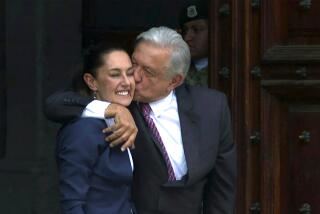POLITICS : Mexico’s 65-Year-Old Ruling Party Under Pressure to Retire
- Share via
MEXICO CITY — Mexico’s ruling Institutional Revolutionary Party celebrated its 65th birthday this week amid growing pressure for the official party to retire.
A cartoon in the independent daily La Jornada showed party Chairman Fernando Ortiz Arana blowing out the candles on a cake that had caught fire.
Increasingly, the icing does seem to be melting on the system of ward politics that has kept Mexico stable under the iron fist of the PRI, as the party is known, since 1929. Demands are growing for President Carlos Salinas de Gortari to match the free-market economic reforms of the last decade with democratic political reform.
For the first time, opposition parties now govern in three states--in two thanks to back room deals that followed elections in which the PRI was accused of fraud. But increasingly, Mexicans are saying that is not enough, and they want a clean election when they vote forpresident Aug. 21.
Further, the Jan. 1 rebellion in the southern state of Chiapas has shed a harsh light on the deals with local powerbrokers that have sustained the PRI.
The government’s negotiator in peace talks with the rebels has admitted that theland reforms at the heart of the 1910 Revolution for which the party is named have never been fully realized in Chiapas--a state that has consistently returned astoundingly high percentages of PRI votes on election days. Land reform has been one of the insurgents’ key demands.
As long as the PRI got the state’s votes, the government turned a blind eye to the huge stretches of land that local officials and their relatives controlled illegally.
Since the uprising, citizens throughout Chiapas have staged takeovers at city halls, demanding the resignations of mayors they say were fraudulently elected.
In addition, rebel demands for electoral reform struck a sympathetic chord throughout the country, provoking numerous marches in the capital and other cities in support of those demands. Opposition leaders gathered in San Cristobal de las Casas, site of the peace talks, to lend their support to demands for political reform.
Applying the adaptation skills that have kept the party in power this long, PRI leaders have even taken up the cry.
Arturo Nunez, general director of the Federal Electoral Institute, which runs national elections, told reporters this week that his agency could be more independent if his job were taken by someone without party affiliation.
Luis Donaldo Colosio, the PRI candidate for president, told 25,000 party faithful gathered Sunday around the Monument to the Revolution to celebrate the anniversary that their party must become more independent of the government.
“The era of political competition in our country has ended any assumption about the existence of an official party,” he said. “The era of political competition is a great chance for us as a party to turn our strength into independence from the government.”
To help make that point, Salinas and most of his Cabinet sent regrets to the PRI anniversary celebration. So did Chiapas peace negotiator Manuel Camacho Solis, a party activist since he was in his teens, who some say hopes to use his current high profile to launch his own presidential bid.
However, a brewing feud between Colosio and Camacho still threatens to split the party before Election Day. In addition, opposition candidate Cuauhtemoc Cardenas, a PRI dropout who many Mexicans believe was cheated out of the presidency by electoral shenanigans in 1988, is skeptical.
“If he wants us to believe there is a separation,” Cardenas said of Colosio, “let him explain how, as a Cabinet minister and PRI chairman, he was independent of . . . Salinas.”
More to Read
Sign up for Essential California
The most important California stories and recommendations in your inbox every morning.
You may occasionally receive promotional content from the Los Angeles Times.













